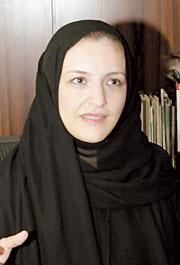JEDDAH, 21 December 2005 — Dr. Nahed Taher has been appointed CEO for the Gulf One Investment Bank, making her the first Saudi woman to head a bank in the Gulf region. Gulf One, headquartered in Bahrain with $100 million in capital, will become operational in the second quarter of 2006.
Gulf One’s financial products and services will focus on mega-energy and infrastructure investments worth $1 trillion over the next 15 years. In addition, it will provide services in restructuring and mergers and acquisitions, a presently non-existent but potentially lucrative segment in regional corporate finance in light of Saudi Arabia’s accession to the World Trade Organization.
The bank is being initiated and promoted by Nahed, a leading Saudi banker and economist, and Ziyad Omar, a Saudi banking and finance executive. Regional investors have come on board to back the initiative. A final list will be announced before the bank begins operation. The Bahrain Monetary Authority (BMA) approved the bank’s license on Dec. 6.
Nahed was a senior economist at the National Commercial Bank, the first woman to hold such a position in a bank in Saudi Arabia.
“Our banks are retail. They focus on commercial activities and not on investing in projects that are both beneficial and profitable to society, such as water treatment and (other) infrastructure projects,” Nahed told Arab News. Gulf One’s vision stems from its founder’s strong belief in the vast investment potential of Gulf Cooperation Council (GCC) infrastructure projects and private equity.
“It is time for the region to focus on its natural strengths, and to direct its wealth to promising real investments that will grow and protect its wealth while building our society. The key to success in banking is in attracting highly talented and experienced human resources and creating an environment that will nurture success,” said Nahed.
Gulf One is focused on building a world-class operation that will inject fresh thinking and utilize innovative solutions to address structural financial and economic needs of the region. The aim is to capitalize on high standards of know-how with the best international financial practice and products.
“The limited availability of long-term financing tools in the Gulf will have negative implications on the region’s ability to cope with the huge demands of financing infrastructure projects mandated by the explosive 3.4 percent per annum population growth,” said Nahed. “With current high oil revenues streaming into the GCC economies there is a critical need to optimize the management of this wealth. The challenge is striking the right balance between future investments and spending on structural reforms, and financing infrastructure shortages. The lack of long-term debt markets will inevitably increase the already high cost of mega-energy and infrastructure projects. Innovative financial solutions should be custom tailored to regional needs according to best global practice in partnership with top international institutions and exceptional local talent,” she added.
Gulf One will be guided by Islamic principles while focusing on wealth creation with added value aiming at achieving economic and social prosperity.


